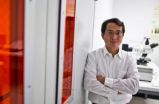(Press-News.org) Pioneering technology by scientists at Queen's University Belfast, which is transforming the lives of millions of people in Asia, is now being used to create safer drinking water in the United States.
The award-winning system – Subterranean Arsenic Removal – removes arsenic from groundwater without using chemicals. It was developed by a team of European and Indian engineers led by Dr Bhaskar Sen Gupta in Queen's University School of Planning, Architecture and Civil Engineering.
The technology, based on the principle of oxidation and filtration processes, is already in use in six plants in West Bengal.
And the technology has now been successfully tested in the United States, in a rural community outside Bellingham, in Northwest Washington State, where high levels of arsenic in the water had previously caused challenges for local residents.
Jeremy Robinson, a member of the Washington State installation team, said: "We first read about the SAR technology on Wikipedia. Initially, it seemed too good to be true. Arsenic is a significant problem for many of the wells in our area. None of the conventional approaches for arsenic treatment have worked well for us. But,
once we recognised the advantages and elegance of the SAR approach, we started preparing to test it here.
"With the generous help offered to us by Dr. Sen Gupta and Queen's University, we are now under way. Our early results have been very promising. We started the trial in January, on an abandoned well with alarmingly high arsenic levels. After three weeks, the arsenic level had dropped substantially. And now, after seven weeks, we are seeing arsenic levels at or below the US Environmental Protection Agency limit."
Dr Sen Gupta, who visited Washington State to oversee the installation, said: "I'm delighted that the Washington State plant testing has gone to plan. The key aspects of this life-changing technology are its affordability and simplicity of installation and operation. The cost of setting up a plant to produce up to 6,000 litres of water a day averages under £2,500 ($4000) – less in the developing world – and the operational cost is £14 a month ($20).
"The estimated life of each plant is about 20 years without any mechanical maintenance, and the system is operated, quite simply, by the pressing of an electrical switch."
The technology has already attracted interest from other parts of the United States, and plans are now advanced for SAR plants to be set up in Cambodia, Vietnam and Mexico in the next six months.
The work of Dr Sen Gupta's team has won accolades from around the world. In November Queen's University was awarded the prestigious Times Higher Education Outstanding Engineering Research Team of the Year title.
The judges said: "Engineering at its core is about solving critical problems. The team from Queen's has exemplified this, finding an innovative solution to overcome arsenic contamination of groundwater and thus improve the quality of life in rural communities."
Dr Sen Gupta was also awarded the St Andrews Prize for the Environment and the World Bank Innovation Fair Championship in Cape Town in 2010.
INFORMATION:
Media inquiries to: Anne Langford, Communications Office, +44 (0)28 9097 5310, mob. 07815 871997, a.langford@qub.ac.uk
Queen's University scientists behind safer drinking water in US
2011-03-02
ELSE PRESS RELEASES FROM THIS DATE:
Stem cell study could aid motor neurone disease research
2011-03-02
Scientists have discovered a new way to generate human motor nerve cells in a development that will help research into motor neurone disease.
A team from the Universities of Edinburgh, Cambridge and Cardiff has created a range of motor neurons – nerves cells that send messages from the brain and spine to other parts of the body – from human embryonic stem cells in the laboratory.
It is the first time that researchers have been able to generate a variety of human motor neurons, which differ in their make-up and display properties depending on where they are located in ...
March Madness: Statisticians quantify entry biases
2011-03-02
By examining historical data, statisticians in the College of Science at Virginia Tech have quantified biases that play a role in granting Division I at-large basketball teams inclusion in the NCAA March Madness Tournament.
Assistant professors Leanna House and Scotland Leman found that in addition to the standard Ratings Percentage Index (RPI) used by the 10-member selection committee, biases such as the team's marquee and the strength of its schedule are also factors.
"We wanted to quantify how much bias there is for bubble teams," Leman said. So-named "bubble teams" ...
Stronger than steel, novel metals are moldable as plastic
2011-03-02
New Haven, Conn.—Imagine a material that's stronger than steel, but just as versatile as plastic, able to take on a seemingly endless variety of forms. For decades, materials scientists have been trying to come up with just such an ideal substance, one that could be molded into complex shapes with the same ease and low expense as plastic but without sacrificing the strength and durability of metal.
Now a team led by Jan Schroers, a materials scientist at Yale University, has shown that some recently developed bulk metallic glasses (BMGs)—metal alloys that have randomly ...
Scientists reveal new insights into tendon injury
2011-03-02
Scientists have discovered how tendons – the fibrous tissue that connects muscle to bone – become damaged through injury or the ageing process in what could lead to new treatments for people with tendon problems.
The University of Manchester team, working with colleagues at Glasgow University, have been investigating 'adhesions', which are a build up of unwanted fibrous tissue on internal organs that have been damaged as a result of surgery or injury.
Adhesions cause organs to stick together and are extremely painful and distressing for patients, who often have to undergo ...
6 different pathways to adulthood
2011-03-02
Only in very few life phases do individuals face as many life transitions in such a short time as young adults at the age of 19-30. The transition from adolescence to adulthood is characterised by frequent changes in status or social roles, such as leaving the parental home, starting a career, entering into working life, forming a partnership and becoming a parent. Assuming civic and social responsibility is also an integral part of the lives of young adults at this particular life phase.
Professor Katariina Salmela-Aro's research team has investigated the transition ...
Solving the riddle of nature's perfect spring
2011-03-02
Scientists have unravelled the shape of the protein that gives human tissues their elastic properties in what could lead to the development of new synthetic elastic polymers.
University of Manchester researchers, working with colleagues in Australia and the United States, used state-of-the-art techniques to reveal the structure of tropoelastin, the main component of elastin.
Elastin allows tissues in humans and other mammals to stretch, for example when the lungs expand and contract for respiration or when arteries widen and narrow over the course of a billion heart ...
New 'frozen smoke' may improve robotic surgery, energy storage
2011-03-02
A spongy substance that could be mistaken for packing material has the nanotechnology world buzzing.
University of Central Florida Associate Professor Lei Zhai and postdoctoral associate Jianhua Zou have engineered the world's lightest carbon material in such a way that it could be used to detect pollutants and toxic substances, improve robotic surgery techniques and store energy more efficiently.
The new material belongs to the family of the lightest solid, also known by its technical name of aerogel or its common nickname of "frozen smoke."
Zhai's team worked with ...
Global ISU study: Invasive species widespread, but not more than at home range
2011-03-02
AMES, Iowa – Invasive plant species have long had a reputation as being bad for a new ecosystem when they are introduced.
Stan Harpole, assistant professor of ecology, evolution and organismal biology at Iowa State University, is founding organizer of a team of more than 70 researchers working at 65 sites worldwide that tested that assumption.
They wanted to know if it is true that problematic invasive species often spread widely in their new habitats because they don't encounter predators or diseases that help keep them in check in their home ranges.
"There is this ...
Henry Ford Hospital sees improved results for more kidney patients through robotic surgery
2011-03-02
Robotic surgery offers the same or better results than minimally invasive laparoscopic procedures for treating kidney disease, and can potentially help more patients because it is not as difficult for surgeons to learn, according to a new study led by Henry Ford Hospital specialists.
The findings come at a time both when chronic kidney disease is becoming more common, and while occult – or hidden – damage to kidney function has been overlooked in more than a fourth of patients with small kidney tumors, according to earlier studies.
This chronic renal insufficiency – ...
Regrets? Study examines how people can cope
2011-03-02
This release is available in French.
Montreal, March 1, 2011 – Although Edith Piaf defiantly sang, "Non, je ne regrette rien," most people will have their share of regrets over their lifetime. Indeed, anyone who seeks to overcome disappointments should compare themselves to others who are worse off – rather than looking up to folks in more enviable positions – according to a new study from Concordia University. Published in the journal Personality and Social Psychology Bulletin, these findings have implications for both young and old.
"Our study examined how younger ...





